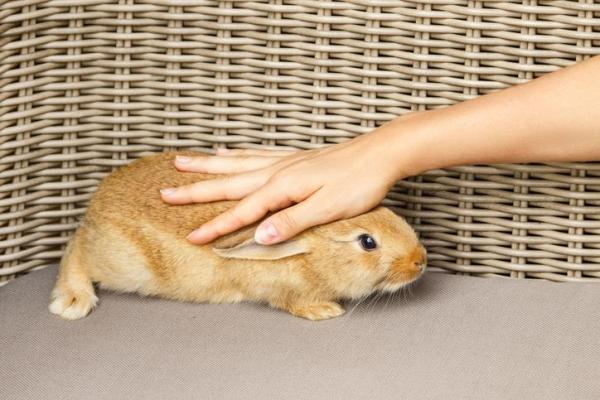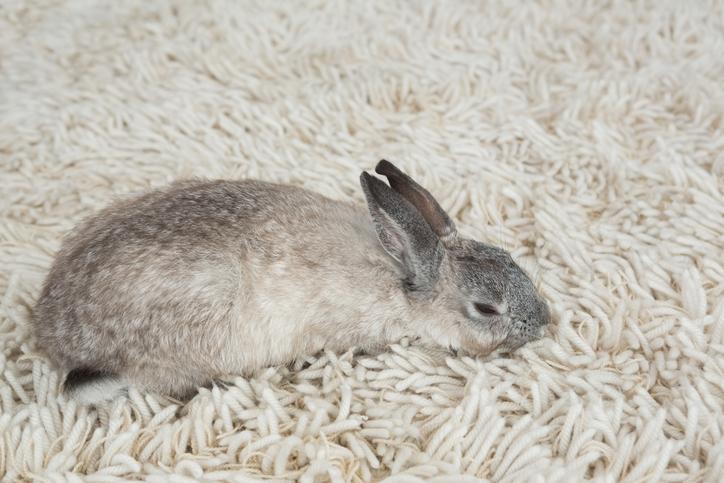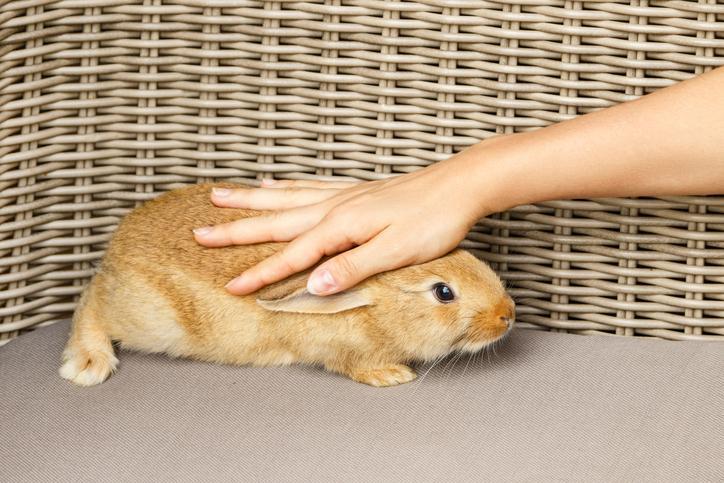My Rabbit Died - What Do I Do with the Body?



See files for Rabbits
The death of a pet is hard to deal with on many levels. There are practical and emotional responses which can make the process difficult if you are not prepared. While we can only prepare ourselves so much when a bunny dies, it is important to know that this is part of a rabbit's natural life cycle. Unfortunately, rabbits do not have the same life expectancy as we humans. Our responsibility as an animal guardian is to take care of their well-being, but our love for them means we extend this care even after they die.
If you are thinking, my rabbit died - what do I do with the body?, it's important to know that disposal of the rabbit's body is only part of the process. AnimalWised goes into the steps you need to take to deal with the death of a pet. If you have some experiences you would like to share, please feel free to discuss them in the comments below.
How do rabbits die?
Rabbits can die for various reasons. One of the most common is the natural consequence of the aging process whereby the body ceases to function. It is a sad occasion, but there is reason for celebration when know our rabbit has had a long and happy life. How long a rabbit will live for depends on various factors, some of which we can influence, others which are beyond our control. In general, a wild rabbit will live between 3 and 4 years of life. Domestic rabbits can live up to 8 years of life, although some breeds may tend to live longer and others less.
However, some rabbit deaths are sadder than others. They may suffer one of the common diseases in rabbits, a list of diseases which rabbits are particularly prone to suffer. Some of these are inherited genetically, others are related to the environment in which they live. There are elements of their essential care which we can use to help ensure they live a longer life. These involve providing the right kind of nutrition, keeping them mentally stimulated, taking care of their hygiene and using preventive medicine to help reduce the possibility of disease.
Accidents can also happen with our rabbits. We need to ensure we keep their cage protected and their runs enclosed. If not, foxes and other predators might be able to get in and kill the rabbits. If they were to escape onto the road, they will be unfamiliar with cars which can lead to accidents. Also, we need to be very careful with what we feed them. There are some plants which are toxic to rabbits and other foods which will do them harm, especially when eaten in large quantities.
Symptoms of a dying rabbit
Rabbits, scientifically known as lagomorphs, may die seemingly without warning. If your rabbit died suddenly, it can be very difficult to process because you a re not expecting it. If your rabbit is particularly old, it is more common to die suddenly. If they are young, it is possible they have had a disease with symptoms that are difficult to detect.
If a rabbit has a disease, there are some symptoms of a dying rabbit you can look out for. If you do detect these symptoms, it is important to know that you should see a veterinary specialist. Here are some of the frequent signs a rabbit is going to die:
- Lack of appetite and thirst: the rabbit does not want to eat or drink water.
- Pain: a sick or very weakened rabbit might show signs of pain and discomfort before death.
- Inactivity: when feeling weak, rabbits usually remain quiet, in a state of lethargy or apathy. They have a lot of difficulty getting up and moving.
- Alterations in vital signs: when a rabbit is going to die, they usually have shortened breath, a slower heart rate and lower body temperature.
- Unusual behavior: a state of vulnerability can produce alterations in behavior of rabbits. They may become nervous, fearful or more aggressive than before.

How to know if a rabbit is dead
We know it can be very difficult at the end stages of life, but it is important to stay with your rabbit if you can. You will be able to help greatly by transmitting a feeling of tranquility, comfort and safety. If you have to see a dead bunny, it can be traumatizing. However, your companion will appreciate greatly having your love and company during their final moments.
When you do stay with your dying rabbit, don't make sudden movements, avoid loud music and don't make loud noises. Nor should you manipulate them excessively. Just stay with them and act as gently as possible. If you are simply not ready to experience the death of your bunny, don't be ashamed. You can ask a family member or friend to help you or take your place.
When your rabbit is dying, you may see their breathing becomes altered, they may become agitated and make nervous movements. Their pulse will slow down and they may start to have tremors or even stiffen. Some people may wonder why their rabbit died stretched out, but this is common in rabbits. They may lie on their side and stretch out as they start to lose life. It can look painful, but it is the end and their suffering will be over soon.
If we want to confirm we have a dead rabbit, we need to confirm the absence of vital signs:
- The rabbit does not breathe and stops moving.
- Absence of a pulse.
- Release of their sphincters (defecation).
- No response time in their capillary refill.
What do do if my rabbit has died
After you are able to confirm the death of your bunny, you will ask yourself some questions. One of the most common is how to dispose of the body. However, there are other considerations you need to make in terms of grieving and what you might want to do next.
- Go to the veterinary clinic: many people need to confirm the death of their pet to start the realization that it has happened at all. If your rabbit has died, we recommend taking them to your trusted veterinarian. They will not only be able to confirm the death, but also help you to deal with any practicalities. Don't expect them to be able to tell you the exact cause of death as this may require expensive tests which will still be unable to bring your rabbit back to life.
- Disposing of a dead bunny: although your rabbit will always remain alive in your memory, you will need to dispose of the body after death. We should never throw a rabbit's body into the trash. It can lead to the appearance of bad smells, harmful pathogens or even scavenging animals. Many clinics or animal hospitals offer an incineration service. This is where the body will be disposed of cleanly in a furnace. Depending on your location, there are also animal funeral homes which will be able to cremate the body and offer a service if you want to say goodbye. Different places offer different services. They may be able to provide an urn or even add the ashes to something you can treasure. You can bury the rabbit in your yard, but there are some problems with this. Animals might try to dig them up and bad weather can accidentally exhume them.
- Mourning: getting over the death of your loved one is not an easy thing to do. You need to learn to live without your beloved rabbit by your side. No one can tell you how long your grief should last. Individuals experiences this period in their own way and it is not good to ignore your feelings. The important thing is to keep positive thoughts, dedicate yourself to beneficial activities, look after yourself and think good things about your lost bunny friend. It is possible the death of a rabbit will affect other aspects of your mental health, so it is important to know if you are having trouble. Don't hesitate to speak to friends or loved ones. If the problem persists, you may even want to speak to a psychologist for some help.
- Explaining death to a child: rabbits are a beloved pet of children. They are especially adorable and docile, with an affectionate and playful temperament. If you are a parent, then it is important that we make our children aware that death will occur at some point and that it is a natural part of life.

What to do after my rabbit died
The process of grieving and losing your rabbit will take different lengths of time for different people. Some people may get over the death relatively quickly. Others may take more time. Whatever we do, we shouldn't force the process of moving on.
One thing some people may want to do is to adopt a new rabbit. Some people will not want to do this right away. The memory of their previous beloved pet is still too fresh and they don't want to go through the thought of more pain. However, some people will find it very helpful to have a new source of bunny joy to help them through the hard times. Just ensure everyone in the family is ready for a new pet and don't surprise anyone. Have a discussion and bring a new rabbit into the family if everyone agrees.
You can also try to ensure you have more than one rabbit in a family. This will not only benefit the rabbits in terms of company, but it will also help soften the loss if one of them were to die.

If you want to read similar articles to My Rabbit Died - What Do I Do with the Body?, we recommend you visit our Extra care category.







 my sweet baby remi, he was only with me for about 6 months but that was long enough for everyone around him to get attached. he got into our garden and ate something that was fatal to him. we wish we had more time with you b!!! i can't stop crying thinking of how i held you in my arms while you took your last breath. you were our baby and will always be, always putting a smile on our faces. I LOVE YOU AND MISS YOU so much b bunicus.
my sweet baby remi, he was only with me for about 6 months but that was long enough for everyone around him to get attached. he got into our garden and ate something that was fatal to him. we wish we had more time with you b!!! i can't stop crying thinking of how i held you in my arms while you took your last breath. you were our baby and will always be, always putting a smile on our faces. I LOVE YOU AND MISS YOU so much b bunicus.

 My sweet holland lop rabbit was getting very ill the last few months but we couldn't afford to take her to the vet, so I had to watch her suffer and it completely broke me. She was eight years old and had lived a long life. I had a weird feeling in my gut a few nights ago that something was not right with her, so I went downstairs just before I wanted to go to sleep. She'd been in the same spot all day and hadn't touched her food or water for about a week!
My sweet holland lop rabbit was getting very ill the last few months but we couldn't afford to take her to the vet, so I had to watch her suffer and it completely broke me. She was eight years old and had lived a long life. I had a weird feeling in my gut a few nights ago that something was not right with her, so I went downstairs just before I wanted to go to sleep. She'd been in the same spot all day and hadn't touched her food or water for about a week! 

